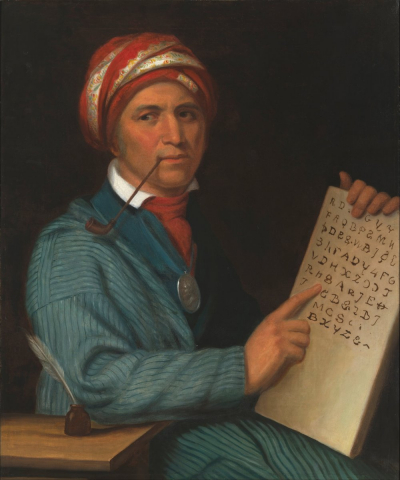The Battle of Echoee, or Etchoe Pass, was a battle on June 27, 1760 during the French and Indian War, between the British and colonial force under Archibald Montgomerie and a force of Cherokee warriors under Seroweh. It took place near the present-day municipality of Otto, in Macon County, North Carolina.
The Cherokee (; Cherokee: ᎠᏂᏴᏫᏯᎢ, romanized: Aniyvwiyaʔi or Anigiduwagi, or Cherokee: ᏣᎳᎩ, romanized: Tsalagi) are one of the indigenous peoples of the Southeastern Woodlands of the United States. Prior to the 18th century, they were concentrated in their homelands, in towns along river valleys of what is now southwestern North Carolina, southeastern Tennessee, edges of western South Carolina, northern Georgia and northeastern Alabama.The Cherokee language is part of the Iroquoian language group. In the 19th century, James Mooney, an early American ethnographer, recorded one oral tradition that told of the tribe having migrated south in ancient times from the Great Lakes region, where other Iroquoian peoples have been based. However, anthropologist Thomas R. Whyte, writing in 2007, dated the split among the peoples as occurring earlier. He believes that the origin of the proto-Iroquoian language was likely the Appalachian region, and the split between Northern and Southern Iroquoian languages began 4,000 years ago.By the 19th century, White American settlers had classified the Cherokee of the Southeast as one of the "Five Civilized Tribes" in the region. They were agrarian, lived in permanent villages, and had begun to adopt some cultural and technological practices of the white settlers. They also developed their own writing system.
Today, three Cherokee tribes are federally recognized: the United Keetoowah Band of Cherokee Indians (UKB) in Oklahoma, the Cherokee Nation (CN) in Oklahoma, and the Eastern Band of Cherokee Indians (EBCI) in North Carolina.The Cherokee Nation has more than 300,000 tribal members, making it the largest of the 574 federally recognized tribes in the United States. In addition, numerous groups claim Cherokee lineage, and some of these are state-recognized. A total of more than 819,000 people are estimated to have identified as having Cherokee ancestry on the U.S. census; most are not enrolled members of any tribe.Of the three federally recognized Cherokee tribes, the Cherokee Nation and the UKB have headquarters in Tahlequah, Oklahoma, and most of their members live in the state. The UKB are mostly descendants of "Old Settlers", also called Western Cherokee: those who migrated from the Southeast to Arkansas and Oklahoma about 1817 prior to Indian Removal. They are related to the Cherokee who were later forcibly relocated there in the 1830s under the Indian Removal Act. The Eastern Band of Cherokee Indians is located on land known as the Qualla Boundary in western North Carolina. They are mostly descendants of ancestors who had resisted or avoided relocation, remaining in the area. Because they gave up tribal membership at the time, they became state and US citizens. In the late 19th century, they reorganized as a federally recognized tribe.

1760Jun, 27
Cherokee warriors defeat British forces at the Battle of Echoee near present-day Otto, North Carolina during the Anglo-Cherokee War.
Choose Another Date
Events on 1760
- 9Jan
Indian Campaign of Ahmad Shah Durrani
Ahmad Shah Durrani defeats the Marathas in the Battle of Barari Ghat. - 27Jun
Battle of Echoee
Cherokee warriors defeat British forces at the Battle of Echoee near present-day Otto, North Carolina during the Anglo-Cherokee War. - 15Aug
Battle of Liegnitz (1760)
Seven Years' War: Battle of Liegnitz: Frederick the Great's victory over the Austrians under Ernst Gideon von Laudon.

 English
English  español
español  français
français  português
português  русский
русский  العربية
العربية  简体中文
简体中文 